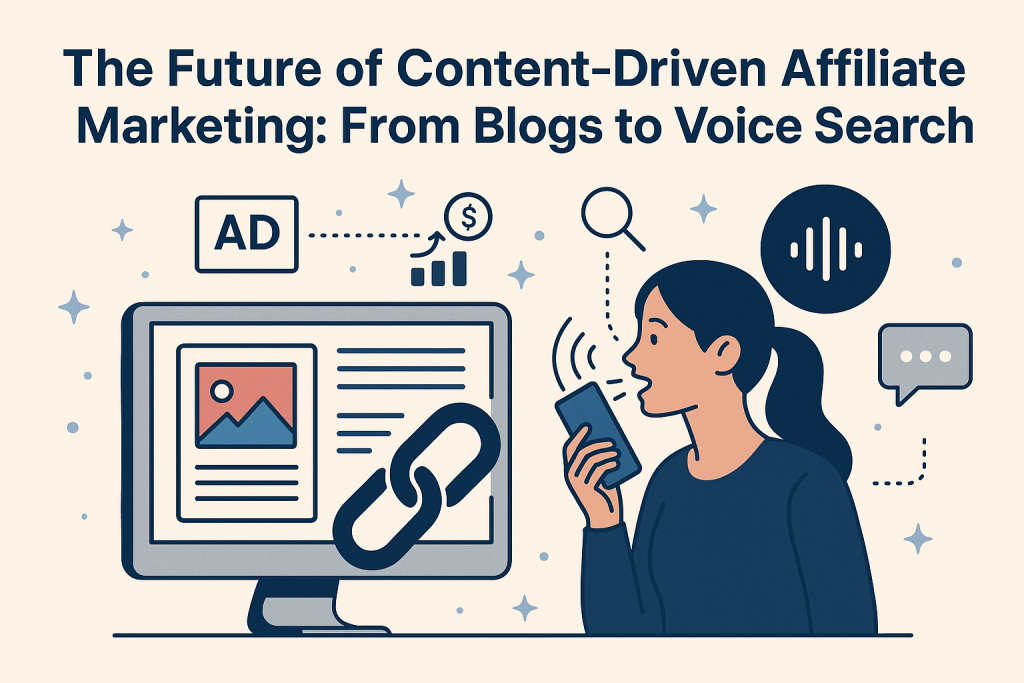As digital consumption habits evolve, affiliate marketing is transforming rapidly, requiring brands and marketers to adopt more dynamic and forward-thinking strategies.

Evolving Landscape of Affiliate Marketing
Affiliate marketing has come a long way from the early days of blog posts filled with static banners and generic links. What was once a straightforward traffic-referral model has now expanded into a multi-faceted, data-driven industry. Content is still king, but its form and function have shifted dramatically.
In today’s environment, affiliate success relies on contextual relevance, platform adaptability, and user-centric strategies. Marketers no longer rely solely on keyword stuffing or traditional SEO techniques. Instead, personalization, intent-matching, and conversational experiences are taking precedence.
With the surge of AI and voice assistants like Siri, Alexa, and Google Assistant, voice search is reshaping the way users interact with content. Affiliates now need to ensure their messaging is compatible with these interfaces. Platforms like melbet partners are already exploring these innovations, blending conventional affiliate approaches with next-gen solutions, helping partners tap into diverse user behaviors.
Key Trends Shaping Affiliate Marketing in 2025
As we enter a new era, several core trends are revolutionizing affiliate marketing practices. These trends signal not only a technological shift but a fundamental change in how audiences consume information and make purchase decisions.
AI-Driven Automation and Predictive Targeting
Artificial Intelligence (AI) is enhancing how affiliates operate. From automated content generation to predictive targeting based on behavioral data, AI tools streamline workflows while improving campaign accuracy. Chatbots, recommendation engines, and AI-driven CRMs now assist marketers in delivering more personalized user journeys.
Enhanced Attribution Models
Traditional last-click attribution is giving way to multi-touch attribution models. These systems offer more granular insights into user interactions across different touchpoints, allowing marketers to optimize conversion paths and allocate budgets more efficiently.
The Rise of Micro-Influencers
While mega-influencers still hold sway, micro-influencers those with smaller but highly engaged audiences are proving more effective in niche markets. Their authenticity and relatability lead to higher conversion rates, making them a valuable asset for affiliate programs seeking trust-based promotion.
Integration of AI and Voice Assistants
Voice search is no longer a novelty it’s a normalized behavior. AI-powered assistants process natural language queries to deliver instant answers, product recommendations, and transactional support. For affiliate marketers, this means adapting content to match spoken language, focusing on intent rather than just keywords. Including question-and-answer formats and concise responses enhances visibility in voice search environments.
The Rise of Social Media Influence
Social platforms are now among the top-performing channels for affiliate marketing like https://melbetpartners.com/ . Instagram Reels, TikTok videos, and YouTube Shorts offer high engagement potential. These platforms enable marketers to demonstrate products organically within relatable content formats.
Quick stats from IMD Business School show that 71% of Gen Z trust influencer recommendations more than branded advertisements. Marketers must, therefore, harness visual storytelling and short-form videos while adhering to transparent affiliate disclosures.
Optimizing Content for Voice Search
Voice search optimization is an urgent necessity for affiliate marketers. Users no longer type “best gaming laptop 2025”, but rather ask, “What’s the best laptop for gaming this year under $1,000?”
To align with this behavior, marketers must:
- Use conversational keywords
- Answer specific queries directly
- Include question-based headers
Well-structured responses not only serve users better but increase the chances of being selected as featured snippets in Google’s voice results.
Implementing Structured Data and FAQs
To enhance visibility in voice-enabled search, structured data (Schema.org markup) is essential. It signals to search engines the purpose and format of content.
Key actions:
- Use FAQ schema to mark up question-and-answer sections
- Add product review schema for affiliate links
- Implement breadcrumb schema for improved crawlability
Creating a clear and informative FAQ list also improves mobile UX and supports SEO, making content more likely to be pulled into voice responses.
Example FAQ Questions:
- What are the best affiliate niches for voice search?
- How does AI affect affiliate marketing commissions?
- Can you track voice search-driven affiliate clicks?
Challenges and Opportunities Ahead
Despite its advantages, voice search poses some limitations. Most devices only read out one answer, which reduces exposure for other brands. Moreover, some voice assistants restrict third-party affiliate suggestions due to privacy or monetization guidelines.
However, this challenge presents an opportunity for first-mover advantage. Marketers who optimize early can become the default source for high-intent queries.
By focusing on semantic relevance, short-form answers, and schema usage, affiliates can establish visibility before the competition catches up.
Embracing AI-Driven Personalization
AI isn’t just about automation it’s about intelligent customization. Advanced machine learning models analyze user preferences to serve curated product lists or promotions.
Examples of personalization in affiliate marketing:
- Dynamic pricing banners based on user behavior
- Location-specific offers
- Retargeting through email or in-app notifications
As data privacy regulations evolve, marketers will also need to balance personalization with ethical data usage, gaining trust through transparency.
Conclusion
The evolution of affiliate marketing is unfolding at a rapid pace. From static blog posts to real-time, AI-powered conversations, the shift is both thrilling and complex. Voice search, automation, and data-driven personalization are not optional they are the new standard.
Affiliate marketers must adapt their strategies to embrace emerging technologies and user expectations. Those who do will gain a decisive edge in the digital marketplace of tomorrow.